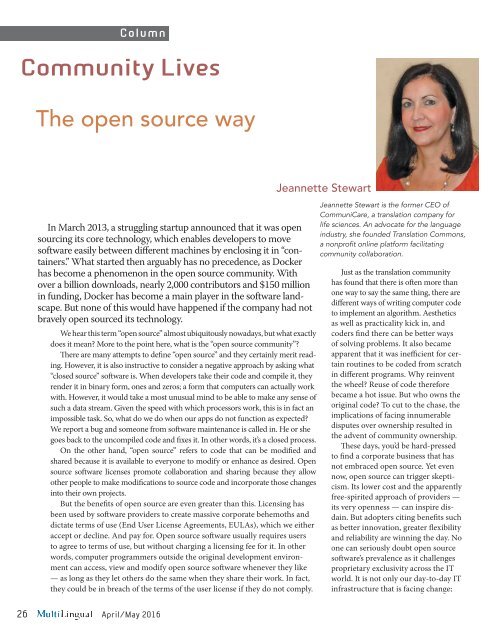Localization
z99kl79
z99kl79
Create successful ePaper yourself
Turn your PDF publications into a flip-book with our unique Google optimized e-Paper software.
Column<br />
Community Lives<br />
The open source way<br />
In March 2013, a struggling startup announced that it was open<br />
sourcing its core technology, which enables developers to move<br />
software easily between different machines by enclosing it in “containers.”<br />
What started then arguably has no precedence, as Docker<br />
has become a phenomenon in the open source community. With<br />
over a billion downloads, nearly 2,000 contributors and $150 million<br />
in funding, Docker has become a main player in the software landscape.<br />
But none of this would have happened if the company had not<br />
bravely open sourced its technology.<br />
We hear this term “open source” almost ubiquitously nowadays, but what exactly<br />
does it mean? More to the point here, what is the “open source community”?<br />
There are many attempts to define “open source” and they certainly merit reading.<br />
However, it is also instructive to consider a negative approach by asking what<br />
“closed source” software is. When developers take their code and compile it, they<br />
render it in binary form, ones and zeros; a form that computers can actually work<br />
with. However, it would take a most unusual mind to be able to make any sense of<br />
such a data stream. Given the speed with which processors work, this is in fact an<br />
impossible task. So, what do we do when our apps do not function as expected?<br />
We report a bug and someone from software maintenance is called in. He or she<br />
goes back to the uncompiled code and fixes it. In other words, it’s a closed process.<br />
On the other hand, “open source” refers to code that can be modified and<br />
shared because it is available to everyone to modify or enhance as desired. Open<br />
source software licenses promote collaboration and sharing because they allow<br />
other people to make modifications to source code and incorporate those changes<br />
into their own projects.<br />
But the benefits of open source are even greater than this. Licensing has<br />
been used by software providers to create massive corporate behemoths and<br />
dictate terms of use (End User License Agreements, EULAs), which we either<br />
accept or decline. And pay for. Open source software usually requires users<br />
to agree to terms of use, but without charging a licensing fee for it. In other<br />
words, computer programmers outside the original development environment<br />
can access, view and modify open source software whenever they like<br />
— as long as they let others do the same when they share their work. In fact,<br />
they could be in breach of the terms of the user license if they do not comply.<br />
Jeannette Stewart<br />
Jeannette Stewart is the former CEO of<br />
CommuniCare, a translation company for<br />
life sciences. An advocate for the language<br />
industry, she founded Translation Commons,<br />
a nonprofit online platform facilitating<br />
community collaboration.<br />
Just as the translation community<br />
has found that there is often more than<br />
one way to say the same thing, there are<br />
different ways of writing computer code<br />
to implement an algorithm. Aesthetics<br />
as well as practicality kick in, and<br />
coders find there can be better ways<br />
of solving problems. It also became<br />
apparent that it was inefficient for certain<br />
routines to be coded from scratch<br />
in different programs. Why reinvent<br />
the wheel? Reuse of code therefore<br />
became a hot issue. But who owns the<br />
original code? To cut to the chase, the<br />
implications of facing innumerable<br />
disputes over ownership resulted in<br />
the advent of community ownership.<br />
These days, you’d be hard-pressed<br />
to find a corporate business that has<br />
not embraced open source. Yet even<br />
now, open source can trigger skepticism.<br />
Its lower cost and the apparently<br />
free-spirited approach of providers —<br />
its very openness — can inspire disdain.<br />
But adopters citing benefits such<br />
as better innovation, greater flexibility<br />
and reliability are winning the day. No<br />
one can seriously doubt open source<br />
software’s prevalence as it challenges<br />
proprietary exclusivity across the IT<br />
world. It is not only our day-to-day IT<br />
infrastructure that is facing change;<br />
26 April/May 2016


